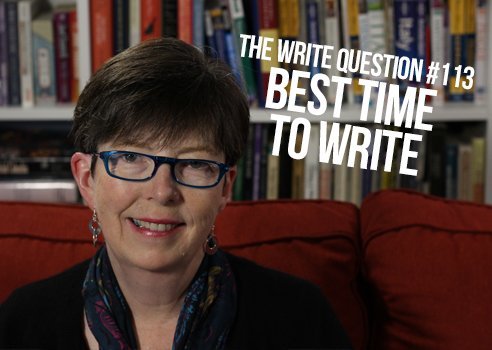Viewing time: 3 mins. 52 secs.
The Write Question is a weekly video podcast about writing that I started in 2017 and that ran, more or less weekly, until April 2022. This is a republication of issue #113, which discusses the best time to write. The post first ran on Oct. 25/19.
Transcript:
Do you know how to find the best time to write? That’s the topic I’m addressing today in The Write Question. I’m Daphne Gray-Grant, the Publication Coach.
I have a question from Anna Lopez, a writer based in San Diego, California. Here’s what she’s asked:
“Has any research shown when the brain is most creative? Or is it different for everyone, depending on whether you’re an early morning person or a night owl? And how does our creativity change over the course of the day?
Thanks for the very sophisticated question, Anna. Cognitive neuroscience began in the 1960s and these scientists have helped uncover information that no one ever knew for certain before.
Back when I was a child, I was a night owl and my parents saw me as lazy and stubborn for hating to get out of bed every morning. Now we understand that people are born hard-wired with certain sleep rhythms, also known as chronotypes, and they have nothing to do with laziness.
There are morning larks, night owls and so-called third-birds, the people who fall in the middle. If you want to track your peak energy time of day — which differs from your peak creativity time — then it depends what kind of bird you are. For energy, I’m providing a link to a blog post by productivity expert Chris Bailey, below.
But let’s get back to the question of creativity. This is related to the part of our brain where self-monitoring and self-criticism take place. (Hint: this is NOT the creative part!) It is known as the prefrontal cortex.
But the area directly behind it, known as the medial prefrontal cortex, deals with memory and emotion. THIS is a creative part of the brain.
American neurologist Charles Limb, who is based in California, concludes that when people are creative, the prefrontal cortex is suppressed. And, at the medial prefrontal cortex is activated. I’m including a link below to a story on his study of jazz musicians.
But here’s the most interesting point about Dr. Limb’s work. The ability to quiet the prefrontal cortex seems to be linked to your level of expertise. And how do you get expertise? Practice! So worry more about getting enough practise, rather than the specific time you do.
I usually recommend writing in the morning because there’s some evidence that creative activity is highest during and immediately after sleep. But here’s the bigger benefit: if you build the habit of writing in the morning, you don’t have to spend any time chastising yourself for failing to write. You’ll have eaten your frog first thing in the day and you’ll feel great.
Of course, for die-hard night owls, I don’t think this advice is going to be terribly effective. So let me say this: In many ways, it really doesn’t matter what time you write, as long as you get yourself out of the way and actually do it.
Finally, let me wrap up with a quote from that’s been attributed to many writers but seems to have come from the pen of American writer William Faulkner: “I write when I’m inspired and I see to it that I’m inspired at nine o’clock every morning.”
Anna, writing is NOT about inspiration. Instead, it’s about perspiration. Don’t look too hard for creativity. Instead, look for enough opportunities to practice.
Links
Three ways to calculate your peak energy time of day
When is the best time to write? (blog post)


